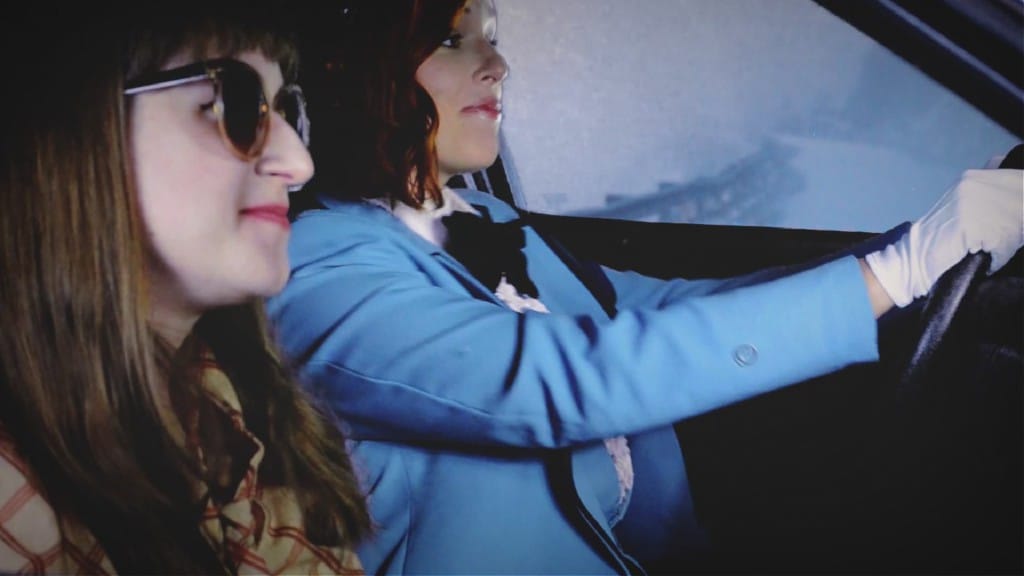[This article contains a lot of spoilers for the story of Roundabout]
“Can’t you just be straight with me?” Beth begs in the backseat of the revolving limousine.
Georgio finally agrees to Beth’s request. For the first time, the limo isn’t automatically spinning and drives rigidly forward, orthogonal, almost as if were being handled by a “normal” driver. Beth sees her struggling to drive in a straight line, battling against the willing curves of the steering wheel, and offers words of encouragement. She knows this can’t last.
“Georgio struggled. Driving straight felt … wrong. Awkward,” the narrator says.
It wasn’t until these closing moments that Roundabout‘s allegorical narrative for the struggles of not belonging—pointedly, of being queer—became apparent to me.
///
No one can explain how or why Georgio Manos drives in circles. That’s her B-movie super power gifted to her by the allowances of absurdity and ’70s cheese. It’s accepted as part of her identity: the famous revolving limousine chauffeur. She spins and is unable to stop, prevented from settling, always on the road and between destinations.
Populations are churned into brightly colored gore under Manos’s tires
Unable to fit in with the rest of the traffic, Manos should be weighed down by alienation and insecurity, but instead she’s turned her unusual ability into a profession. She becomes a force for good: a jolt on the steering wheel forces a couple on an awkward first date into each other’s arms, later they get married in the backseat of the limo. Manos ties knots by taking people to where they need to go, and she does it in style. Be there no doubt, however, that all of this comes at a cost.
You can’t escort your customers in the longest road vehicle around—leaving floral skidmarks in your wake—without causing grievous damage, no matter how much emancipated fun you’re having. Populations are churned into brightly colored gore under Manos’s tires and a city’s infrastructure is mostly always ablaze once she’s passed through. Other cars put up a battle, turning Manos’s place of work against her by littering the roads as indestructible blockades, and constantly circling roundabouts to try to stop her.
While Roundabout‘s world might seem goofy, it’s only the result of having to adapt life around a person who brings constant destruction. She moves through cities like a wrecking ball on wheels and, miraculously, the denizens have it all repaired by the time she comes by once again. Even the slaughtered citizens return in full form only to nonchalantly complain “That’s the third time this week”, as their face is smeared by a familiar tire tread.
She can’t help it, Manos brings chaos wherever she goes, and it’s for this reason that she represents the ‘movability’ of outsiders. Her identity is without anchor, it doesn’t fit in, and so she seeks motivation in finding promise elsewhere. It arrives when her queer admirer, Beth, encourages her into the city, where fame, fortune, and love apparently await.

It proves to hold an unsurprising appeal over Manos knowing that she can escape the suburb that tires of her presence, as is the case in so many queer narratives. As Daniel Harris describes, being a gay teenager in the ’70s, ostracized by the community he grew up in, the “protective enclave” of Broadway and Hollywood, “that promised immunity from shame and judgment”, beckoned with its eccentricity and indulgence. So, too, does the city for Manos.
She pursues this appeal, guided by her mechanic (who supports her by fixing and upgrading her limo) into the city where she escorts wealthy big shots like Charles Maximilian, and zig-zags a four-wheel hustle like no other. So caught up in the pursuit of reaching the heights of indulgence and fame is Manos that she even takes drugs (referred to as “candy”) to enhance her skills, in turn conjuring up a skeleton friend that acts as a hallucinatory precursor.
a queer couple kicking up the dust of the desert
With the mechanic’s help, Manos does climb to the top of the city’s prestige against the odds, literally jumping her spinning limousine across the rooftops of its skyscrapers to collect the spinning topside gold coins. As the narrative demands, she then plummets right back down after accidentally causing the death of her biggest spin-driving rival during a race that she won.
Death never affected her before but this one is representative of her crashing excess, her caustic pursuit of the American Dream. Adding to the devastation, Manos’s to-be-girlfriend, Beth, who warned her of the dangers of her recklessness beforehand, decides to abandon her.

After pulling herself back together, Manos manages to return to her equilibrium, winning back Beth just as the cops close in on her. The ending is as it has to be: Beth and Manos take to the open road together, a queer couple kicking up the dust of the desert into the windscreens of the cops behind them. It’s the “driving into a dream” ending that Daniel Cunningham noticed defines so much of the New Queer Cinema that emerged in the ’90s.
But you don’t play Roundabout for any of this. You play because it feels good to spin through a city that isn’t suited to you, adapting the straightness of the roads to the disruptive circles that you weave, fighting against your limo-tations. Yes, of course it’s schlocky, of course it’s campy—that is and always has been the language of the frivolous outsider.
You can purchase Roundabout from its official website as well as on Steam.





